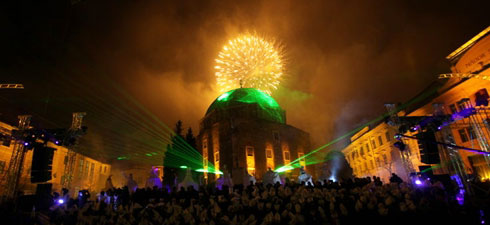“Hungary will have two capitals in 2010,” prime minister Gordon Bajnai proclaimed to 20,000 spectators at Széchenyi Square in Pécs on 10 January. This announcement was promptly booed by the crowd, which is perhaps not a very cultured reaction: after all, even if one of the capitals is “cultural”, that is not enough for us to feel truly European. Over the past few years we have been manhandling a project that lost its virginity the very day of the announcement, when the municipality at the time, smelling big money in the offing, ousted the very associations to which the city owed this prestigious designation in the first place. Still and all, Pécs still has an abundance of cultural events lined up for 2010 [350 scheduled events over the course of the year], which are bound to draw throngs of Hungarian and foreign tourists. Five years ago, the initial question was whether Hungary was capable of creating a cultural life outside the capital that would be worthy of Europe’s attention. That this question was the main issue at a time when 11 cities were vying for the title shows how un-European we really are. In the more favoured regions of the continent, no-one would have considered proposing a political capital, since the whole point of the exercise is regional development and decentralisation.
If we had hoped the designation of Pécs back in 2005 would spark a change in the prevailing mindset, we must be disappointed now. Right after the inauguration, the locals began complaining about lukewarm writeups in the media, and to prove his city’s cultural superiority the editor-in-chief of a Pécs news portal sent the “Budapest intellectuals” packing. Though there was precious little media coverage of Pécs 2010 during the years of preparation, that was not owing to a plot hatched in the nation’s capital, but to the deplorable incompetence of those in charge of the event. The main reason is indeed the antagonism between the capital and the province; after all, we would be more au courant with the ups and downs of the project if the host city were Budapest and not Pécs. Manifestly frustrated as a result, Pécs is now looking for some form of consolation: hence the triumphant announcement by the city’s mayor, Zsolt Páva, that 59% of the Hungarian population had watched the opening ceremony. Now one has to go back 20 years in time for an audience of that magnitude, back to the days when there was only one single channel and Hungarian television was not yet in such abysmal shape. The mayor was off by a few million: of the people watching TV that night, 9.4% saw the ceremony.
Secret negociations
The show was organised by an agency in Budapest, which does not exactly attest to the local skills in Pécs, but could stand to reason. Less readily intelligible, on the other hand, is why the meals for the reception “had” to be ordered from Budapest, as though there was nothing available in Pécs but potatoes and bread and butter. Another bone of contention: the minutes of the negotiations on the designation of Pécs were classified as secret by the government for 20 years. So the legend is going to last for at least another 15 years. Two observations on this score. For one thing: the foreign members of the panel were less sensitive to the fact that, a year earlier, Pécs’ socialist mayor had done everything in his power for the “Ferenc of all of Hungary” [Ferenc Gyurcsány, head of government from 2004 to 2009] to become prime minister. For another, the fact that the only reaction to Pécs’ designation as European Capital of Culture was the denigration of another city does not denote a high level of culture. In short, the only thing missing from the debate over Hungary’s year in the cultural limelight is the essence of the exercise: culture. If, in a year’s time, we manage to discuss with a modicum of calm the successes and failures of the project, all these trials and tribulations will not have been in vain. If we don’t, Hungary should never again take part in such contests, as it will only heap discredit upon itself.
Opinion
Three cities for culture
This year three cities hold the title of European Capital of Culture: Pécs, Essen and Istanbul. The Hungarian city of 160,000 inhabitants feels a bit dwarfed by the other two. At the opening ceremonies in Pécs, “the lineup of celebrities like [singers] Ferenc Demjén, Evelyne Kandech and Györgyi Lang and the procession presenting the history of Pécs could not vie with the firecrackers exploding in Essen” that same day, reports HVG. “Despite the wintry weather in Essen, 100,000 turned out for the occasion, including president of the European Commission José Manuel Barroso and German president Horst Köhler.”
The Budapest weekly notes that Essen (pop. 600,000) is not exactly famed for its cityscape or exuberant cultural life. That is why the boosters included in the project 53 towns in the Ruhr region and are trying to transform this “industrial eyesore” into a cultural flagship city. As to Istanbul and its 10 million inhabitants, which touts itself as “the most inspiring city in the world”, HVG points out that it receives some seven million visitors year in, year out. For the Turks, who are not part of the EU, it was vital to rise to the challenge, which is why the state is footing 99% of the bill.
Was this article useful? If so we are delighted!
It is freely available because we believe that the right to free and independent information is essential for democracy. But this right is not guaranteed forever, and independence comes at a cost. We need your support in order to continue publishing independent, multilingual news for all Europeans.
Discover our subscription offers and their exclusive benefits and become a member of our community now!












